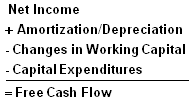Free Cash Flow - FCF
A measure of financial performance calculated as operating cash flow minus capital expenditures. Free cash flow (FCF) represents the cash that a company is able to generate after laying out the money required to maintain or expand its asset base. Free cash flow is important because it allows a company to pursue opportunities that enhance shareholder value. Without cash, it's tough to develop new products, make acquisitions, pay dividends and reduce debt. FCF is calculated as:

It can also be calculated by taking operating cash flow and subtracting capital expenditures.
|||Some believe that Wall Street focuses myopically on earnings while ignoring the "real" cash that a firm generates. Earnings can often be clouded by accounting gimmicks, but it's tougher to fake cash flow. For this reason, some investors believe that FCF gives a much clearer view of the ability to generate cash (and thus profits).
It is important to note that negative free cash flow is not bad in itself. If free cash flow is negative, it could be a sign that a company is making large investments. If these investments earn a high return, the strategy has the potential to pay off in the long run.

It can also be calculated by taking operating cash flow and subtracting capital expenditures.
 | |
| Watch: Free Cash Flow |
|||Some believe that Wall Street focuses myopically on earnings while ignoring the "real" cash that a firm generates. Earnings can often be clouded by accounting gimmicks, but it's tougher to fake cash flow. For this reason, some investors believe that FCF gives a much clearer view of the ability to generate cash (and thus profits).
It is important to note that negative free cash flow is not bad in itself. If free cash flow is negative, it could be a sign that a company is making large investments. If these investments earn a high return, the strategy has the potential to pay off in the long run.
附件列表
词条内容仅供参考,如果您需要解决具体问题
(尤其在法律、医学等领域),建议您咨询相关领域专业人士。
如果您认为本词条还有待完善,请 编辑
上一篇 Free Asset Ratio - FAR 下一篇 Free Cash Flow For The Firm - FCFF
